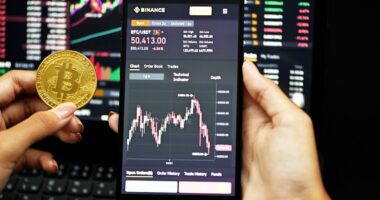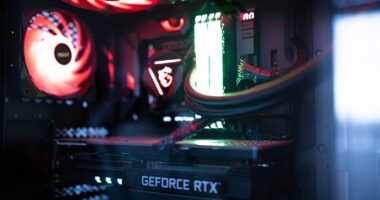The digital art market has undergone a significant transformation with the introduction of Non-Fungible Tokens (NFTs). NFTs are unique digital assets that represent ownership or authenticity of specific digital content, including artwork, videos, and music. This technology has revolutionized the buying, selling, and ownership of digital art by creating tamper-proof digital certificates of ownership.
In recent years, the NFT market has experienced rapid growth, attracting numerous artists and creators seeking to capitalize on this new form of digital ownership. This increased interest has resulted in record-breaking sales of NFT artwork, with some pieces selling for millions of dollars at auction. The rise of NFTs has provided artists with new opportunities to monetize their work and reach a global audience without relying on traditional art galleries or intermediaries.
The emergence of NFTs has also prompted a shift in how digital art is perceived and valued. Digital art is now viewed as a valuable and unique asset that can be traded similarly to physical artwork, rather than being seen as ephemeral or easily replicable. This change has democratized the art world, allowing artists from diverse backgrounds to showcase and sell their work globally.
Furthermore, NFTs have introduced increased transparency and security to the art market. Each transaction is recorded on a blockchain, providing an immutable record of ownership. As a result, the rise of NFTs in the digital art market has not only transformed art commerce but also challenged conventional notions of ownership and authenticity in the digital era.
Key Takeaways
- NFTs are revolutionizing the digital art market by providing a secure and transparent way to buy, sell, and trade digital artwork.
- FTX’s entrance into the NFT ecosystem has brought significant attention and investment, leading to increased liquidity and market growth.
- Ethereum’s smart contract capabilities have made it the preferred blockchain for NFT transactions, providing security and flexibility for buyers and sellers.
- Bitcoin’s influence on NFT investments has brought mainstream attention to the digital asset space, driving up demand and prices for NFTs.
- FTX’s innovation in NFT technology, including fractionalized ownership and enhanced security features, is shaping the future of NFT trading and investment.
FTX’s Impact on the NFT Ecosystem
User-Friendly Interface and Robust Security
FTX’s user-friendly interface and robust security features have made it an attractive option for both experienced traders and newcomers looking to enter the NFT market.
Innovative Features and New Investment Opportunities
Additionally, FTX has introduced innovative features such as fractionalized ownership of NFTs, allowing users to invest in high-value pieces of art without having to purchase the entire asset. This has opened up new investment opportunities for individuals who may not have had access to high-value art in the traditional market.
Support for Emerging Artists and Broader Market Integration
FTX’s impact on the NFT ecosystem has also extended to its support for emerging artists and creators, providing them with a platform to showcase their work and connect with potential buyers from around the world. Furthermore, FTX’s integration of NFTs into its broader cryptocurrency ecosystem has helped bridge the gap between traditional finance and the digital art market. By allowing users to trade NFTs alongside other cryptocurrencies, FTX has facilitated greater liquidity and price discovery for NFT assets. This integration has also contributed to the mainstream adoption of NFTs, as it provides a seamless experience for users who are already familiar with trading cryptocurrencies.
Ethereum’s Role in NFT Transactions

Ethereum, the second-largest cryptocurrency by market capitalization, has played a pivotal role in facilitating NFT transactions through its blockchain network. The Ethereum blockchain has become the go-to platform for hosting NFTs due to its smart contract functionality, which allows for the creation and execution of custom contracts without the need for intermediaries. This has made it possible for artists and creators to mint their own NFTs and establish ownership rights without relying on third-party platforms.
Additionally, Ethereum’s decentralized nature ensures that NFT transactions are secure, transparent, and resistant to censorship or tampering. This level of trust and reliability has been crucial in establishing Ethereum as the leading blockchain for NFT transactions. Moreover, Ethereum’s support for decentralized applications (dApps) has enabled the development of NFT marketplaces and platforms that have further fueled the growth of the NFT ecosystem.
These dApps provide users with a seamless experience for buying, selling, and trading NFTs, while also offering features such as royalties for creators and interoperability with other blockchain networks. As a result, Ethereum’s role in NFT transactions has not only provided a robust infrastructure for hosting NFTs but has also fostered an environment for innovation and creativity within the digital art market.
Bitcoin’s Influence on NFT Investments
| Metrics | Data |
|---|---|
| Number of NFT transactions | Increasing |
| Percentage of NFT purchases made with Bitcoin | Rising |
| Bitcoin’s impact on NFT market value | Significant |
| Number of NFT platforms accepting Bitcoin | Growing |
Bitcoin, the first and most well-known cryptocurrency, has had a significant influence on NFT investments by shaping the broader cryptocurrency market and investor sentiment. As Bitcoin continues to gain mainstream acceptance as a store of value and investment asset, it has brought greater attention to the potential for digital assets to appreciate in value over time. This has had a spillover effect on NFT investments, as investors have become more open to diversifying their portfolios with unique digital assets such as artwork, collectibles, and virtual real estate.
The rise of Bitcoin has also led to an influx of capital into the cryptocurrency market, providing individuals with greater purchasing power to invest in high-value NFTs. Furthermore, Bitcoin’s influence on NFT investments can be seen in the growing trend of using Bitcoin as a means of purchasing NFTs. Many NFT marketplaces and platforms now accept Bitcoin as a form of payment, providing users with greater flexibility and accessibility when acquiring digital assets.
This integration of Bitcoin into the NFT ecosystem has further legitimized NFT investments as a viable alternative asset class within the broader cryptocurrency market. Overall, Bitcoin’s influence on NFT investments has been instrumental in shaping investor behavior and attitudes towards digital assets, paving the way for greater acceptance and adoption of NFTs as an investment vehicle.
FTX’s Innovation in NFT Technology
FTX has been at the forefront of innovation in NFT technology by introducing new features and capabilities that have enhanced the user experience and expanded the possibilities for NFT ownership. One such innovation is FTX’s development of decentralized finance (DeFi) protocols that enable users to leverage their NFT assets as collateral for loans or yield farming. This integration of DeFi with NFTs has created new avenues for users to generate passive income from their digital assets while retaining ownership rights.
Additionally, FTX has introduced cross-chain compatibility for NFTs, allowing users to seamlessly transfer their assets between different blockchain networks without compromising security or decentralization. Moreover, FTX’s commitment to environmental sustainability has led to the development of eco-friendly NFT technology that reduces the carbon footprint associated with minting and trading digital assets. By leveraging energy-efficient blockchain networks and implementing sustainable practices, FTX has set a new standard for responsible NFT technology that aligns with growing concerns about the environmental impact of blockchain technology.
This focus on sustainability not only benefits the planet but also enhances FTX’s reputation as a forward-thinking and socially responsible platform for NFT transactions.
The Future of NFTs and FTX’s Contribution

Democratizing Ownership and Wealth Creation
FTX’s commitment to expanding access to NFTs through fractionalized ownership and DeFi integration is expected to democratize ownership of high-value digital assets and provide new avenues for wealth creation among users.
Sustainability and Interoperability
Additionally, FTX’s emphasis on sustainability and cross-chain compatibility is likely to set new industry standards for responsible and interoperable NFT technology that benefits both users and the environment.
Mainstream Adoption and Industry Best Practices
Looking ahead, FTX’s contribution to the future of NFTs is expected to drive greater mainstream adoption of digital assets as legitimate investment vehicles within the broader cryptocurrency market. As more individuals recognize the potential for value appreciation and diversification offered by NFTs, FTX’s innovative approach to NFT technology will play a pivotal role in shaping user behavior and industry best practices.
The Intersection of FTX, NFTs, and the Crypto Market
The intersection of FTX, NFTs, and the broader crypto market represents a convergence of innovative technologies that have reshaped traditional notions of ownership, investment, and value exchange. FTX’s integration of NFTs into its cryptocurrency ecosystem has facilitated greater liquidity and price discovery for digital assets while providing users with a seamless experience for trading both cryptocurrencies and NFTs. This intersection has also led to new opportunities for creators to monetize their work and reach global audiences without relying on traditional intermediaries or gatekeepers.
Furthermore, the intersection of FTX, NFTs, and the crypto market has sparked a cultural shift in how we perceive digital ownership and value creation. As more individuals recognize the potential for value appreciation offered by unique digital assets, there is growing acceptance of NFTs as legitimate investment vehicles within the broader cryptocurrency market. This convergence has also led to greater awareness of environmental sustainability within blockchain technology, as platforms like FTX prioritize eco-friendly practices that reduce the carbon footprint associated with minting and trading digital assets.
In conclusion, the intersection of FTX, NFTs, and the crypto market represents a paradigm shift in how we buy, sell, and own digital assets while challenging traditional notions of ownership and value exchange. As FTX continues to innovate in NFT technology and drive mainstream adoption of digital assets, this intersection is expected to reshape industry standards and user behavior while fostering a more inclusive and sustainable ecosystem for creators and investors alike.
FAQs
What is FTX NFT?
FTX NFT is a platform created by the cryptocurrency exchange FTX that allows users to buy, sell, and trade non-fungible tokens (NFTs).
How does FTX NFT work?
FTX NFT operates as a marketplace for digital art and collectibles, where users can create, buy, and sell NFTs using cryptocurrency.
What is the impact of FTX NFT on the digital art market?
FTX NFT has shaken up the digital art market by providing a platform for artists and collectors to engage in NFT transactions with lower fees and greater accessibility.
Is FTX NFT only for digital art?
While FTX NFT is known for its digital art marketplace, it also supports the creation and trading of NFTs for other digital collectibles such as virtual real estate and gaming items.
How does FTX NFT differ from other NFT platforms?
FTX NFT sets itself apart from other NFT platforms by offering a user-friendly interface, lower transaction fees, and integration with the FTX cryptocurrency exchange.





